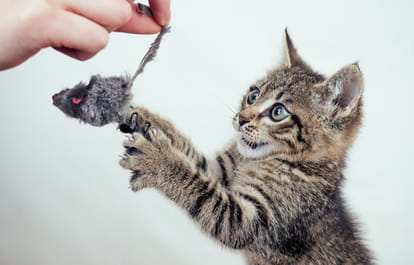
You have a new kitten, and you want it to catch mice.
Or, maybe you want to be sure it does not catch and kill these tiny rodents.
Kittens have an automatic instinct for catching mice,you can help them develop this skill or discourage it.A kitten isn’t able to chase and catch them until they are 3-4 months old. Some individual kittens and breeds are more likely to like hunting.
This article tells you how to encourage a kitten to catch mice and also how to discourage it from doing this.
The Kittens Who Will Be Good at Catching Mice
To tell if a kitten is likely to be good at catching mice, look for these factors.
- The behavior of the individual kitten is a better indicator than the breed.
- It has an abundance of energy and quick reflexes.
- They’re born in a rural area or location where plenty of mice live.
- Female kitten because they are usually better at catching mice than males.
Cat specialists say that neutering and spaying do not affect kittens’ desire to catch mice.
The Age Kittens Start Catching Mice

Kittens become interested in mice very early in life, but that does not mean they can actually chase and catch them right away.
Most kittens won’t be able to start catching mice until they are three to four months old. But you can start training them for this job at an earlier age.
Best Cat Breeds for Mice Catching
While the behavior of an individual kitten is the best indicator of its mouse catching abilities, the following breeds have good reputations as mousers.
- Maine Coon
- American Shorthair
- Manx
- Siamese
- Burmese
- Chartreux
- Japanese Bobtail
A Kitten Will Catch Mice if You Encourage It
Most kittens are naturally inclined to catch mice. Kittens even respond to the presence of mice before they open their eyes due to this instinct.
However, not all individual kittens are interested in catching mice, and females are usually better hunters than males.
If you already have a kitten and you want it to become good at catching mice, here’s how you can help your furry friend develop this skill:
- Frequently play with the kitten with toys or other objects resembling the size of a mouse.
- Let the kitten spend time in a darkened room at dusk and dawn.
- If possible, when the kitten is old enough to go outside alone, let it out at dawn and dusk.
- Expose the kitten to a live mouse if possible.

Playing with your kitten with toys that resemble mice will help develop the desire to catch these rodents.
Spending time in a dark room at dusk and dawn stimulates a kitten’s desire to hunt because these are the hours when cats naturally do the most hunting.
If you can let your kitten out safely at dawn and dusk for an hour or so, this is one of the best ways of encouraging it to learn the art of catching mice.
Kittens are strongly hardwired to catch mice: They even respond to the smell of one a week or two after birth before their eyes open.
By exposing the kitten to a live mouse, you will trigger the instinct for catching them.
You might even try killing a mouse in a trap and then giving it to the kitten. Or tie the dead mouse to a string as a toy to encourage the kitten’s enthusiasm for catching mice.
Of course, never use a dead mouse that has been killed with poison to train a kitten, or the kitten is likely to get sick or die from the contact.
Mother cats frequently bring dead mice to show their kittens, and this example helps them build their desire to catch mice independently.
Kittens Catch Mice Even When They’re Not Hungry
Hunger is not the only reason kittens and cats hunt mice. Often, a kitten catches a mouse, plays with it for a while, and does not eat it.
Opportunity is a more significant factor for why kittens chase after mice and other animals. Limiting or exposing their opportunity for mice catching is the best way of controlling this behavior.
Cats are obligate carnivores, and that means they need mostly meat in their diet for good health. Older kittens and fully-grown cats need about 3 to 4 ounces of food a day, the equivalent of about five or six mice.
Based on this fact, we can see that most mouse catching for kittens is more an instinctual enjoyment for the sport and thrill of the hunt and not a matter of hunger.
However, if a kitten lacks meat in its diet, it might be more inclined to try and catch mice. So providing a high-quality diet of meat is essential for the animal’s health and happiness, and it may help discourage mice catching.
How to Put Off a Kitten from Catching Mice
Maybe you feel sorry for mice and don’t want your pet going around catching these tiny creatures. If that’s the case, here are some ways to discourage a kitten from catching mice and other prey.
- Get a kitten that seems less active and energetic than others.
- Keep your kitten indoors at dawn and dusk.
- Play gently with them instead of getting it too excited while playing.
- Get a kitten that was not exposed to mice by its mother or elsewhere early in life.
If your kitten catches a mouse anyway, take it away and tell the kitten ‘No!”
But do not punish a kitten that catches a mouse. Mice catching is a powerful instinct in domestic cats, and it’s better to try and redirect this energy than punish it.
Cat researchers say that if a kitten does not learn how to catch mice in the first six months of its life, it is unlikely to develop this behavior later.
So, if you do not want your kitten to catch mice, play with it gently and keep it busy with other activities for the first half-year. It will probably not be interested in chasing mice after that.
Catching Mice Can Be Bad for Kittens
If you need to get rid of mice in your house, a kitten might seem like the perfect solution. However, there can be problems when kittens become mice catchers.
For one thing, kittens and cats often kill mice and other prey and then just leave the dead body there for you to clean up.
Don’t expect your kitten to eat the mice it catches, and be on the lookout for dead mice lying around if your kitten turns out to be a good hunter.
Another issue is when a kitten brings a live mouse inside and then lets it go free to scurring around your house. It might be hard to find and catch the mouse if this happens, and the kitten may lose interest after it lets the mouse go.
Catching mice can also be a hazard for a kitten if it gets bitten by the rodent or catches a disease from playing with it or eating it.
If you encourage your kitten to catch mice, take these precautions:
- Stay up to date on your kitten’s vaccinations.
- Monitor the kitten for fleas caught from being around mice.
- Don’t rely solely on the kitten to take care of a mouse problem.
If you have a problem with mice in your house, a new kitten might be able to help you but use other rodent control measures such as:
- Traps
- Eliminating food sources
- Eliminating bedding materials
- Closing holes where mice can enter the house
If you have a kitten or cat, be very cautious about using rodent poisons to control the problem. The kitten could eat a poisoned mouse and get sick or die as a result.
On the positive side, a kitten or cat in a house can discourage mice from moving in. Mice are naturally afraid of cats, and having a feline friend around can prevent them from taking up residence or sticking around.
Conclusions about Kittens Catching Mice
Cats, kittens, and human beings have been living together for thousands of years. One of the main reasons is that these feline friends are so good at catching mice, and mice damage human property and health.
If you want to, you can take advantage of a kitten’s natural born instincts to help you control mice around your home. Look for an energetic, active kitten, and then play hunting games with it to develop its interest and skill in mouse catching.
If you don’t want a kitten to chase mice, look for a gentle, slow individual and keep it away from hunting opportunities and vigorous play for the first six months of its life.
